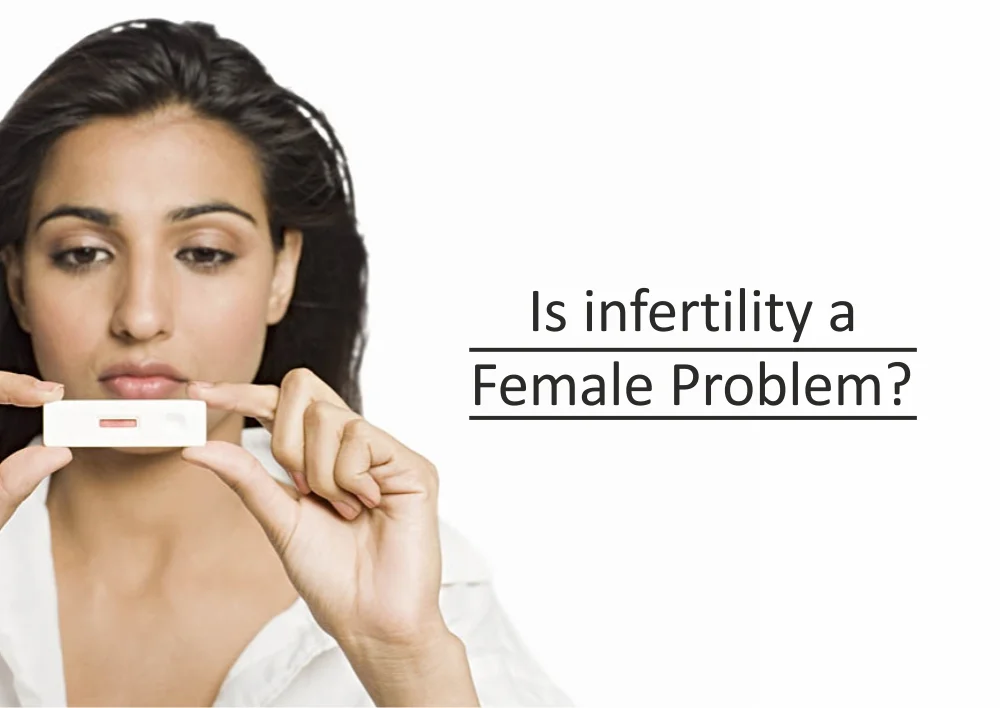Is Infertility a Female Problem?
No, infertility can either be male/female or both. Both men and women can have problems which causes difficulty for the couple to conceive. About one-third of the infertility problems are due to female factors (like blockage in the tubes or disturbances in ovulation); another one-third are due to male factors (like erection problems or low sperm count); 10-20% are due to combined male and female factors and in the rest of the couples, no cause of infertility is established. So, infertility is not entirely a female’s problem.
Infertility is a complex and emotionally challenging issue that affects millions of couples worldwide. When the topic of infertility arises, it is often associated with women and their reproductive health. However, this assumption overlooks a critical aspect of the matter: male infertility. In reality, infertility can result from various factors in both men and women. This blog aims to debunk the myth that infertility is solely a female problem and shed light on the factors that contribute to infertility in both genders.
Understanding Infertility:
Infertility is defined as the inability to conceive a child after trying for at least one year without using contraception. It can be a result of numerous factors, ranging from biological, lifestyle, and environmental influences. Approximately one in eight couples struggle with infertility, and in about one-third of these cases, the issue lies with the female partner, one-third with the male partner, and the remaining one-third involves both partners or has an unidentified cause also known as unexplained infertility.
Infertility in Females:
- Age-related factors: As women age, their fertility declines due to a decrease in the number and quality of eggs. This is a natural process and a leading factor in female infertility.
- Ovulation disorders: Irregular or absent ovulation can hinder conception. Conditions like polycystic ovary syndrome (PCOS) and hypothalamic dysfunction are common culprits.
- Structural issues: Abnormalities in the reproductive organs, such as blocked fallopian tubes or uterine fibroids, can prevent sperm from reaching the egg or hinder embryo implantation.
- Endometriosis: A painful disorder where tissue resembling the uterine lining grows outside the uterus, impacting fertility.
- Hormonal imbalances: Disruptions in hormone levels can affect the menstrual cycle and fertility.
Infertility in Males:
- Sperm abnormalities: Issues with sperm production, motility, or morphology can significantly impact male fertility.
- Varicocele: A condition marked by enlarged veins in the testicles that can affect sperm production.
- Hormonal imbalances: Similar to females, imbalances in male hormones can affect fertility.
- Ejaculation disorders: Problems with ejaculation or semen delivery can hinder the union of sperm and egg.
- Structural problems: Blockages or congenital abnormalities in the male reproductive tract can cause infertility.
Common Causes Shared by Both Male & Female:
A.) Lifestyle factors: Habits like smoking, excessive alcohol consumption, drug use, poor diet, and sedentary lifestyles can affect fertility in both men and women.
B.) Obesity: Being significantly overweight or underweight can disrupt hormone levels and fertility in both genders.
C.) Sexually transmitted infections (STIs): Untreated STIs can lead to infertility in both men and women by causing damage to the reproductive organs.
D.) Stress: Prolonged stress can interfere with reproductive hormones and the overall fertility of both partners.
The Importance of Seeking Help Together:
It is crucial for couples facing infertility to approach the issue as a team. While societal norms might place the burden of fertility struggles on women, it is essential to remember that both partners equally contribute to the process. By seeking professional help together, couples can undergo thorough fertility evaluations, which may include physical exams, medical history assessments, and fertility tests for both the male and female partners.
Available Treatments:
The good news is that advancements in medical technology have provided various treatments to address infertility issues in both men and women. Depending on the root cause, treatments may include lifestyle changes, medication, surgery, intrauterine insemination (IUI), in vitro fertilization (IVF), and more. These treatments have helped many couples fulfil their dreams of becoming parents.
Conclusion:
Infertility is a shared burden that affects both men and women equally. Understanding the factors contributing to infertility in each gender is crucial in seeking appropriate medical interventions and support. It is essential for couples facing fertility challenges to communicate openly, seek professional help from fertility treatment specialists, and consider various treatment options available. By debunking the myths surrounding infertility and embracing a comprehensive view, we can better support individuals and couples on their journey towards building a family. Remember, seeking help and support is a sign of strength and determination, and there is hope for those struggling with infertility.








.webp)






Was the information useful?
0 0